‘It’s a war’: Meet the volunteers leading the fight against Trump’s immigration raids

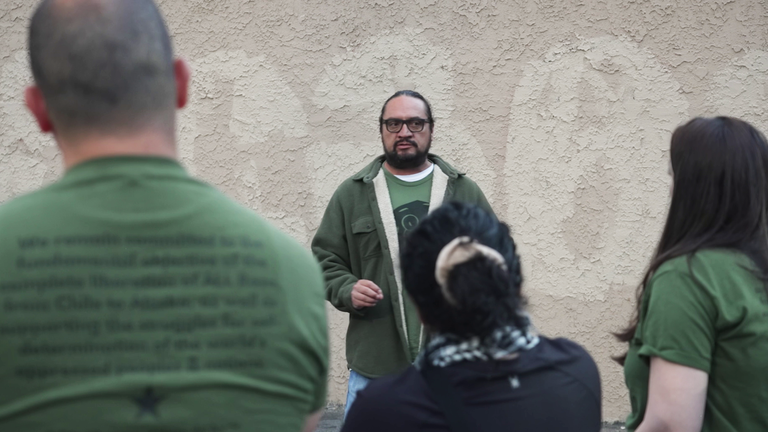
It’s 5.30am, but the car park outside a laundrette in south central Los Angeles is already bustling.
A woman is setting up a stand selling tacos on the pavement and the sun is beginning to rise behind the palm trees.
A group of seven women and two men are gathered in a circle, most wearing khaki green t-shirts.
The leader, a man named Francisco “Chavo” Romero, begins by asking how everyone is feeling. “Angry,” a few of them respond. “Proud of the community for pushing back,” says another.
Ron, a high school history teacher, issues a rallying cry. “This is like Vietnam,” he says. “We’re taking losses, but in the end we’re going to win. It’s a war.”
This is what the resistance against Donald Trump’s immigration policy looks like here. In the past month, immigration and customs enforcement agents – known as ICE – have intensified their raids on homes and workplaces across Los Angeles.
Since the beginning of June, nearly 2,800 undocumented immigrants have been arrested in the city, according to the Department of Homeland Security. The previous monthly high was just over 850 arrests in May this year.
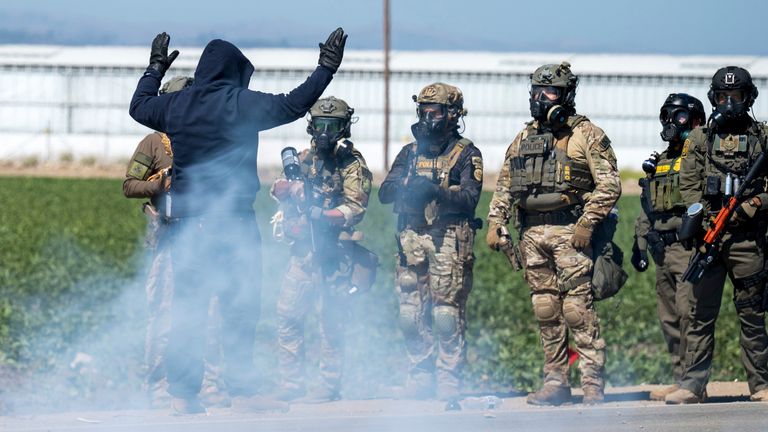
Videos have circulated online of people being tackled to the ground in the car park of DIY shops, in car washes and outside homes. The videos have prompted outrage, protests and a fightback.
“Chavo” and Ron belong to a group of organised volunteers called Union del Barrio. Every morning, a group of them meet, mostly in areas which have high immigrant populations.
The day I meet them, they’re in an area of LA which is heavily Latino. Armed with walkie talkies to communicate with each other, megaphones to warn the community and leaflets to raise awareness they set out in cars in different directions.
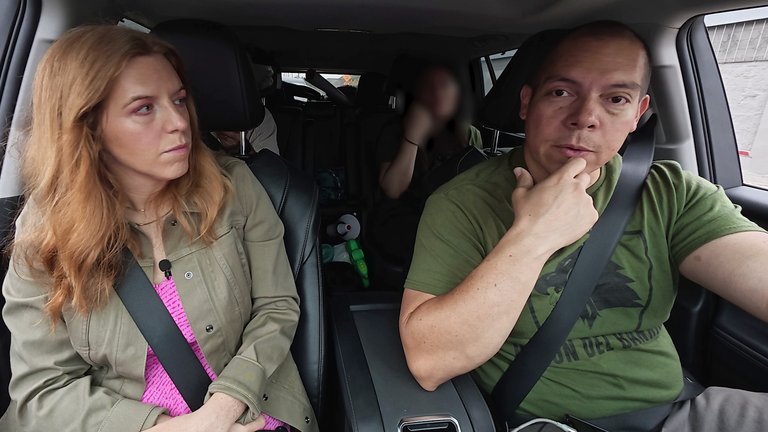
They’re looking for cars used by ICE agents to monitor “targets”.
“That vehicle looks a little suspicious,” says Ron, pointing out a white SUV with blacked-out windows, “but there’s nobody in it”.
An elderly Latino man is standing on a street corner, cutting fruit to sell at his stall. “He’s the exact target that they’re looking for,” Ron says. “That’s what they’re doing now. The low-hanging fruit, the easy victim. And so that is proving to be more successful for their quotas.”
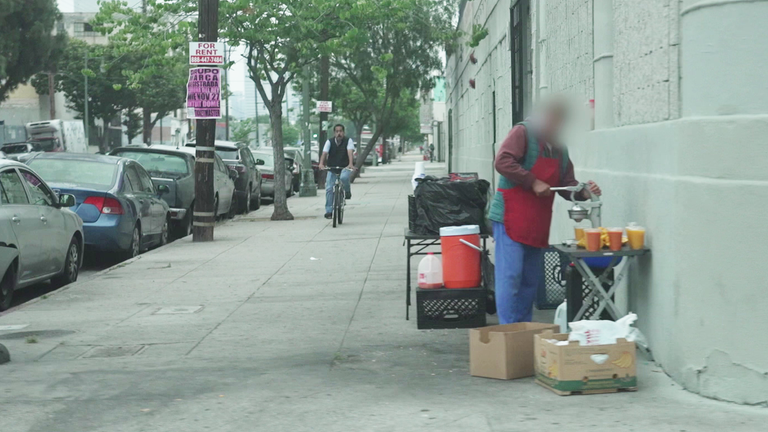
In the end, it turns out to be a quiet morning in this part of LA, no brewing immigration operations. But elsewhere in the city, dawn raids are happening.
ICE agents are under pressure from the White House to boost their deportation numbers in line with Donald Trump’s campaign promise to crack down on illegal immigration.
Please use Chrome browser for a more accessible video player

2:18
In June, tear gas and rubber bullets were fired at protestors demonstrating against immigration raids
Maria’s husband Javier was one of those arrested in LA. He came to the United States from Mexico when he was 19 and is now 58.
The couple have three grown-up children and two grandchildren. But Javier’s work permit expired two years ago, according to Maria and so he was living here illegally.
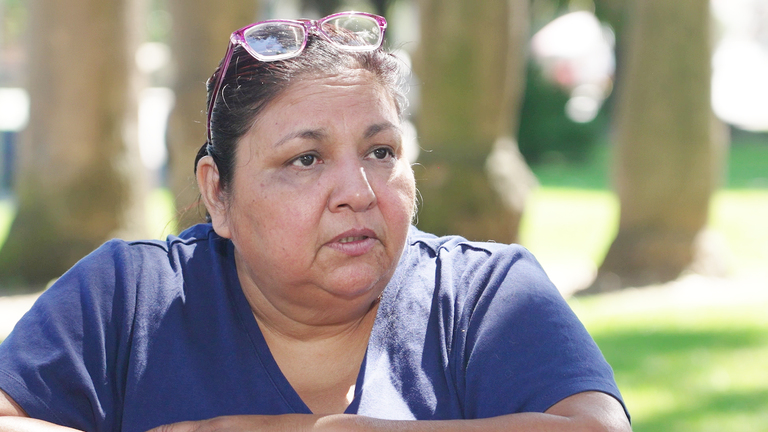
She shows me a video taken last month when Javier was at work at a car wash in Pomona, an area of LA. He is being handcuffed and arrested by armed and masked ICE agents, forced into a car. He is now being held at a detention centre two hours away.
“I know they’re doing their job,” she says, “but it’s like, ‘you don’t have to do it like that.’ Getting them and, you know, forcing people and pushing them down on the ground. They’re not animals.”
Please use Chrome browser for a more accessible video player

0:58
US troops accused of ‘political stunt’ after park raid
Maria wipes away tears as she explains the impact of his absence for the past four weeks. “It’s been so hard without him,” she says. “You feel alone when you get used to somebody and he’s not there any more. We’ve never been apart for as long as this.”
The family have a lawyer and is appealing for him to remain in the US, but Maria fears he will be sent back to Mexico or even a third country.
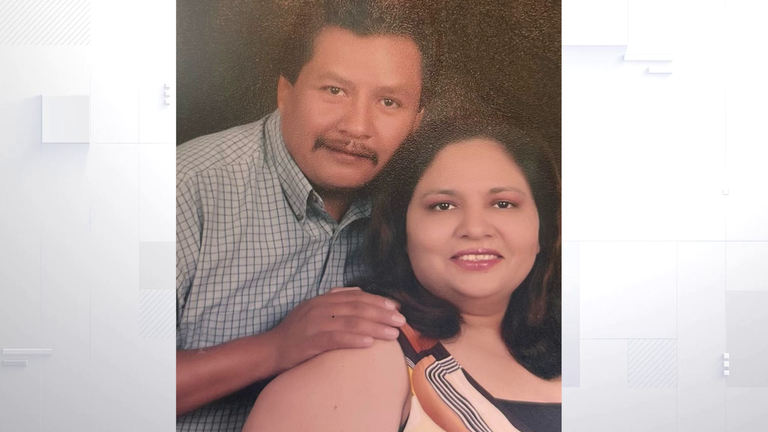
“I don’t know what to say to my grandkids because the oldest one, who is five was very attached to his papas, as he calls him. And he’s asking me, ‘When is papa coming home?’ and I don’t know what to say. He’s not a criminal.”
The fear in immigrant communities can be measured by the empty restaurant booths and streets that are far quieter than usual.
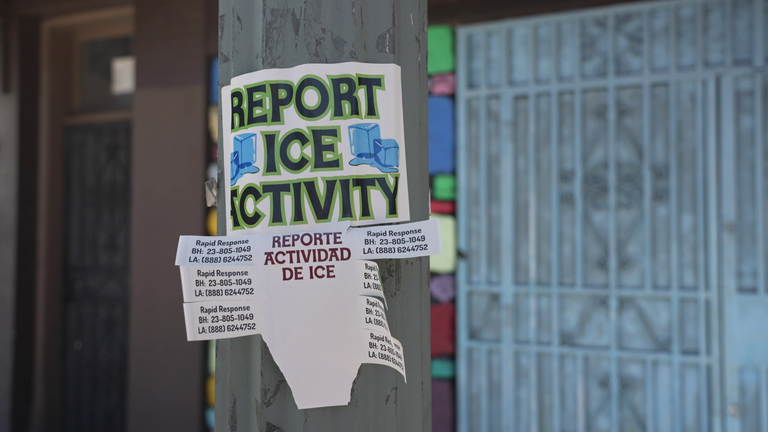
I meet Soledad at the Mexican restaurant she owns in Hollywood. When I arrive, she’s watching the local news on the TV as yet another raid unfolds at a nearby farm.
She’s shaking her head as ICE agents face off with protesters and military helicopters hover overhead. “I am scared. I am very scared,” she says.
All of her eight employees are undocumented, and four of them are too scared to come into work, she says, in case they get arrested. The process to get papers, she says, is too long and too expensive.
Read more from Sky News:
Farmer first to die during ICE raids
Trump warns comic over citizenship
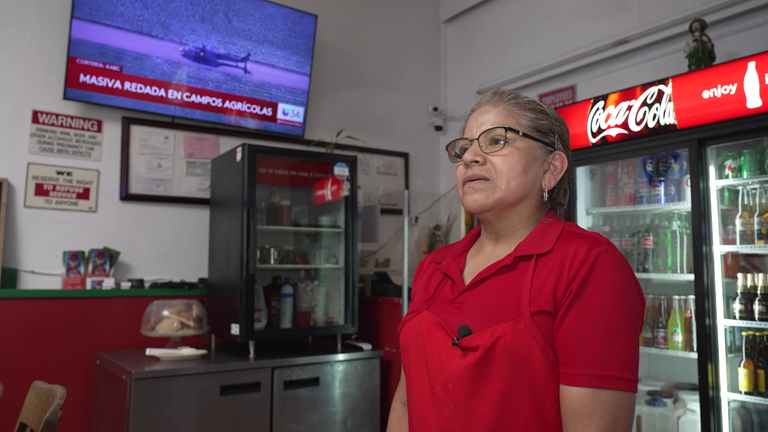
“They call me and tell me they are too afraid to come in because immigration is around,” she says.
“I have to work double shifts to be able to make up for their hours, and yes, I am very desperate, and sometimes I cry… We have no sales, and no money to pay their wages.”
There is just one woman eating fajitas at a booth, where there would usually be a lunchtime rush. People are chilled by the raids.

Listen to The World with Richard Engel and Yalda Hakim every Wednesday
Soledad says she plans to hide her illegal workers if immigration officials arrive.
“I’ve told them, get inside the fridge, hide behind the stove, climb up where we have a space to store boxes, do not run because they will hunt you down.”
The White House says they’re protecting the country from criminals. ICE agents have been shot at while carrying out operations, their work becoming more dangerous by the day.
The tension here is ratcheting up. Deportation numbers are rising too. But the order from Donald Trump is to arrest even more people living here illegally.

